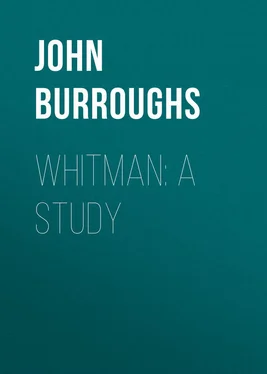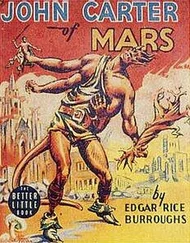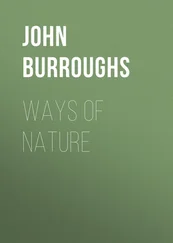John Burroughs - Whitman - A Study
Здесь есть возможность читать онлайн «John Burroughs - Whitman - A Study» — ознакомительный отрывок электронной книги совершенно бесплатно, а после прочтения отрывка купить полную версию. В некоторых случаях можно слушать аудио, скачать через торрент в формате fb2 и присутствует краткое содержание. ISBN: , Жанр: foreign_antique, foreign_prose, на английском языке. Описание произведения, (предисловие) а так же отзывы посетителей доступны на портале библиотеки ЛибКат.
- Название:Whitman: A Study
- Автор:
- Жанр:
- Год:неизвестен
- ISBN:http://www.gutenberg.org/ebooks/30342
- Рейтинг книги:5 / 5. Голосов: 1
-
Избранное:Добавить в избранное
- Отзывы:
-
Ваша оценка:
- 100
- 1
- 2
- 3
- 4
- 5
Whitman: A Study: краткое содержание, описание и аннотация
Предлагаем к чтению аннотацию, описание, краткое содержание или предисловие (зависит от того, что написал сам автор книги «Whitman: A Study»). Если вы не нашли необходимую информацию о книге — напишите в комментариях, мы постараемся отыскать её.
Whitman: A Study — читать онлайн ознакомительный отрывок
Ниже представлен текст книги, разбитый по страницам. Система сохранения места последней прочитанной страницы, позволяет с удобством читать онлайн бесплатно книгу «Whitman: A Study», без необходимости каждый раз заново искать на чём Вы остановились. Поставьте закладку, и сможете в любой момент перейти на страницу, на которой закончили чтение.
Интервал:
Закладка:
The poet breaks a sprig of lilac from the bush in the door-yard, – the dark cloud falls on the land, – the long funeral sets out, – and then the apostrophe: —
"Coffin that passes through lanes and streets,
Through day and night, with the great cloud darkening the land,
With the pomp of the inloop'd flags, with the cities draped in black,
With the show of the States themselves, as of crape-veiled women, standing,
With processions long and winding, and the flambeaus of the night,
With the countless torches lit – with the silent sea of faces, and the unbared heads,
With the waiting depot, the arriving coffin, and the sombre faces,
With dirges through the night, with the thousand voices rising strong and solemn;
With all the mournful voices of the dirges, pour'd around the coffin,
To dim-lit churches and the shuddering organs – Where amid these you journey,
With the tolling, tolling bells' perpetual clang;
Here! coffin that slowly passes,
I give you my sprig of lilac.
"(Nor for you, for one alone;
Blossoms and branches green to coffins all I bring;
For fresh as the morning – thus would I chant a song for you, O sane and sacred death.
"All over bouquets of roses,
O death! I cover you over with roses and early lilies;
But mostly and now the lilac that blooms the first,
Copious, I break, I break the sprigs from the bushes;
With loaded arms I come, pouring for you,
For you and the coffins all of you, O death.)"
Then the strain goes on: —
"O how shall I warble myself for the dead one there I loved?
And how shall I deck my song for the large sweet soul that has gone?
And what shall my perfume be, for the grave of him I love?
"Sea-winds, blown from east and west,
Blown from the eastern sea, and blown from the western sea, till there on the prairies meeting:
These, and with these, and the breath of my chant,
I perfume the grave of him I love."
The poem reaches, perhaps, its height in the matchless invocation to Death: —
"Come, lovely and soothing Death,
Undulate round the world, serenely arriving, arriving,
In the day, in the night, to all, to each,
Sooner or later, delicate Death.
"Prais'd be the fathomless universe,
For life and joy, and for objects and knowledge curious;
And for love, sweet love – but praise! O praise and praise,
For the sure-enwinding arms of cool-enfolding Death.
"Dark Mother, always gliding near, with soft feet,
Have none chanted for thee a chant of fullest welcome?
Then I chant it for thee – I glorify thee above all;
I bring thee a song that when thou must indeed come, come unfalteringly.
"Approach, encompassing Death – strong Deliveress!
When it is so – when thou hast taken them, I joyously sing the dead,
Lost in the loving, floating ocean of thee,
Laved in the flood of thy bliss, O Death.
"From me to thee glad serenades,
Dances for thee I propose, saluting thee – adornments and feastings for thee;
And the sights of the open landscape, and the high-spread sky are fitting,
And life and the fields, and the huge and thoughtful night.
The night, in silence, under many a star;
The ocean shore, and the husky whispering wave, whose voice I know;
And the soul turning to thee, O vast and well-veil'd Death,
And the body gratefully nestling close to thee."
Whitman despised riches, and all mere worldly success, as heartily as ever did any of the old Christians. All outward show and finery were intensely distasteful to him. He probably would not have accepted the finest house in New York on condition that he live in it. During his hospital experiences he cherished the purpose, as soon as the war was over, of returning to Brooklyn, buying an acre or two of land in some by-place on Long Island, and building for himself and his family a cheap house. When his brother Jeff contemplated building, he advised him to build merely an Irish shanty. After what he had seen the soldiers put up with, he thought anything was good enough for him or his people. In one of his letters to his mother, he comments upon the un-American and inappropriate ornamentation of the rooms in the Capitol building, "without grandeur and without simplicity," he says. In the state the country was in, and with the hospital scenes before him, the "poppy-show goddesses" and the Italian style of decoration, etc., sickened him, and he got away from it all as quickly as he could.
During the war and after, I used to see a good deal of Whitman in Washington. Summer and winter he was a conspicuous figure on Pennsylvania Avenue, where he was wont to walk for exercise and to feed his hunger for faces. One would see him afar off, in the crowd but not of it, – a large, slow-moving figure, clad in gray, with broad-brimmed hat and gray beard, – or, quite as frequently, on the front platform of the street horse-cars with the driver. My eye used to single him out many blocks away.
There were times during this period when his aspect was rather forbidding, – the physical man was too pronounced on first glance; the other man was hidden beneath the broad-brimmed hat. One needed to see the superbly domed head and classic brow crowning the rank physical man.
In his middle manhood, judging from the photos, he had a hirsute, kindly look, but very far removed from the finely cut traditional poet's face.
I have often heard Whitman say that he inherited most excellent blood from his mother, – the old Dutch Van Velser strain, – Long Island blood filtered and vitalized through generations by the breath of the sea. He was his mother's child unmistakably. With all his rank masculinity, there was a curious feminine undertone in him which revealed itself in the quality of his voice, the delicate texture of his skin, the gentleness of his touch and ways, the attraction he had for children and the common people. A lady in the West, writing to me about him, spoke of his "great mother-nature." He was receptive, sympathetic, tender, and met you, not in a positive, aggressive manner, but more or less in a passive or neutral mood. He did not give his friends merely his mind, he gave them himself. It is not merely his mind or intellect that he has put into his poems, it is himself. Indeed, this feminine mood or attitude might be dwelt upon at much length in considering his poems, – their solvent, absorbing power, and the way they yield themselves to diverse interpretations.
The sea, too, had laid its hand upon him, as I have already suggested. He never appeared so striking and impressive as when seen upon the beach. His large and tall gray figure looked at home, and was at home, upon the shore. The simple, strong, flowing lines of his face, his always clean fresh air, his blue absorbing eye, his commanding presence, and something pristine and elemental in his whole expression, seemed at once to put him en rapport with the sea. No phase of nature seems to have impressed him so deeply as the sea, or recurs so often in his poems.
Whitman was preëminently manly, – richly endowed with the universal, healthy human qualities and attributes. Mr. Conway relates that when Emerson handed him the first thin quarto edition of "Leaves of Grass," while he was calling at his house in Concord, soon after the book appeared, he said, "Americans abroad may now come home: unto us a man is born."
President Lincoln, standing one day during the war before a window in the White House, saw Whitman slowly saunter by. He followed him with his eyes, and, turning, said to those about him, "Well, he looks like a man ."
Читать дальшеИнтервал:
Закладка:
Похожие книги на «Whitman: A Study»
Представляем Вашему вниманию похожие книги на «Whitman: A Study» списком для выбора. Мы отобрали схожую по названию и смыслу литературу в надежде предоставить читателям больше вариантов отыскать новые, интересные, ещё непрочитанные произведения.
Обсуждение, отзывы о книге «Whitman: A Study» и просто собственные мнения читателей. Оставьте ваши комментарии, напишите, что Вы думаете о произведении, его смысле или главных героях. Укажите что конкретно понравилось, а что нет, и почему Вы так считаете.












